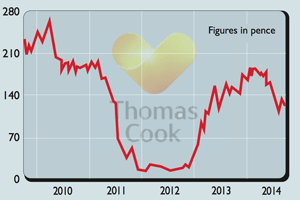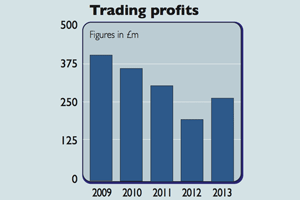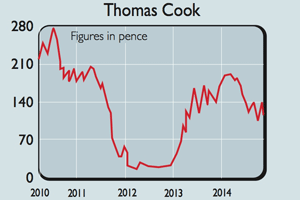Shares in focus: Should you take a trip with Thomas Cook?
Package-holiday provider Thomas Cook has done a good job of turning itself around. So, is it time to get back on board? Phil Oakley investigates.
Get the latest financial news, insights and expert analysis from our award-winning MoneyWeek team, to help you understand what really matters when it comes to your finances.
You are now subscribed
Your newsletter sign-up was successful
Want to add more newsletters?

Twice daily
MoneyWeek
Get the latest financial news, insights and expert analysis from our award-winning MoneyWeek team, to help you understand what really matters when it comes to your finances.

Four times a week
Look After My Bills
Sign up to our free money-saving newsletter, filled with the latest news and expert advice to help you find the best tips and deals for managing your bills. Start saving today!
The journey will be full of risks, but the tickets are too cheap to turn down, says Phil Oakley.
The fortunes of package-holiday providers like Thomas Cook have frequently been somewhat of a roller-coaster ride.
In the past, the main problem has been making sure there have been enough holidays for sale to make a decent profit but not too many holidays so that prices have to be slashed to fill otherwise empty hotel rooms and aeroplane seats.
MoneyWeek
Subscribe to MoneyWeek today and get your first six magazine issues absolutely FREE

Sign up to Money Morning
Don't miss the latest investment and personal finances news, market analysis, plus money-saving tips with our free twice-daily newsletter
Don't miss the latest investment and personal finances news, market analysis, plus money-saving tips with our free twice-daily newsletter
This means that the profits of tour operators have tended to bounce around a lot up one year and down the next.
The problem of balancing supply and demand for holidays has not gone away. What's wreaked havoc with the package-holiday business model though is the growth of the internet and budget airlines. This has led many people to book their own flights and hotels rather than paying a middleman to do it.
There are still plenty of people that like someone else to sort everything out for them. However, to survive and thrive in this market, holiday providers have to be smart and offer something a little bit different, apart from having the clout to buy lots of cheap flights and hotel rooms.
A couple of years ago, it seemed that Thomas Cook was struggling to get the balance of its business right. A turnaround plan has put it back on the right track, but are its shares worth buying or should you give them a wide berth?
The outlook
Thomas Cook has always had plenty of customers over 20 million last year. This gives it around £9bn of sales a year, but not enough profit to pay shareholders a dividend at the moment. This was the problem that chief executive Harriet Green identified when she took over as boss in July 2012.
There were many reasons for this, but the most important was the company was too complicated. It had too many brands, too many websites and too much debt. Green set about doing something to resolve these issues.
Two years into a business transformation plan, things are looking a lot better. Profits are higher and debt has come down, after shareholders stumped up more cash last year. Yet the stockmarket seems lukewarm towards the company's shares right now.
It is worried about too much capacity in European airlines which pushes down prices for Thomas Cook's own airline business.
Investors are also concerned that German consumers a key market for the company are feeling a bit gloomy about the world and booking fewer holidays than they might otherwise do.
Travel businesses will always be subject to this kind of short-term sentiment, but I can't help thinking that investors are a bit too downbeat. The shares are close to their 52-week low and are ignoring the possibility that Thomas Cook's profits could be a lot higher in a few years' time.
A combination of cost cutting such as shutting high street travel agents and selling better products is on course to deliver a cumulative £460m of profit improvements by next year. Thecompany is very excited about the potential of its portfolio of exclusive hotels, which is expected to grow from just over 300 in 2013 to more than 800 by 2017.
By offering something that sets itself apart from the run of the mill package holiday, the company can charge higher prices and boost its profits margins. The same goes for its focus on the city-breaks market.
There's also more to come from selling more holidays on the internet. This accounts for just over a third of Thomas Cook's sales at the moment the company is targeting 50% which should help to lower costs and boost profits.
Then there's the second half of Thomas Cook's business-transformation plan, which could boost profits by at least another £400m between 2015 and 2018. Admittedly this plan will cost a bit of money to put into action, but the payoff could be well worth it. (We'll learn more about what this plan will actually involve in a few weeks.)
Should you buy the shares
The key question here is what proportion of these cost savings and product improvements will end up in investors' pockets. If you are pessimistic, you could argue that Thomas Cook might need most of these savings to offset headwinds elsewhere.
That said, City analysts seem to think that profits will keep on growing strongly for a while. Trading profits are forecast to be £315m-£335m this year compared with £263m last year. By 2016 they are expected to be £475m. A focus on generating more cash flow could see the company debt free by then too.
Of course a business like this comes with lots of risks. Consumers need to be confident in their finances to spend money on holidays and don't want the worry of wars and conflicts in certain parts of the world. Oil prices can be volatile and a big issue when you fly lots of your own planes. There are also lots of exchange-rate risks to be managed.
Analysts' forecasts are often wrong. But even if profits don't grow at all, I think Thomas Cook shares look very cheap. On my favourite measure of EBIT/EV,they offer a return of 15.2% on 2014 forecast profits and net debt of around £350m. This rises to 27.6% if the company is debt free by 2016. That looks quite tempting, despite the risks.
Verdict: buy
Thomas Cook (LON: TCG)


Buy: 17
Hold: 7
Sell: 2
Target price: 200p
Directors' shareholdings
H Green (CEO): 732,700
M Healy (CFO): 43,701
F Meysman (Chair): 302,000
Get the latest financial news, insights and expert analysis from our award-winning MoneyWeek team, to help you understand what really matters when it comes to your finances.
Phil spent 13 years as an investment analyst for both stockbroking and fund management companies.
-
 Should you buy an active ETF?
Should you buy an active ETF?ETFs are often mischaracterised as passive products, but they can be a convenient way to add active management to your portfolio
-
 Power up your pension before 5 April – easy ways to save before the tax year end
Power up your pension before 5 April – easy ways to save before the tax year endWith the end of the tax year looming, pension savers currently have a window to review and maximise what’s going into their retirement funds – we look at how
-
 Why Thomas Cook collapsed
Why Thomas Cook collapsedFeatures Thomas Cook has gone bust, leaving stakeholders, politicians and managers all blaming each other.
-
 What investors can learn from Thomas Cook's collapse
What investors can learn from Thomas Cook's collapseFeatures Bad decisions and bad debt have led to the collapse of 178-year-old travel company Thomas Cook. John Stepek looks at what investors can learn from its demise.
-
 Thomas Cook’s holiday nightmare
Thomas Cook’s holiday nightmareFeatures High debt, fierce competition and one-off factors have pushed tour operator Thomas Cook to the brink of bankruptcy.
-
Share tips of the week
Features MoneyWeek’s comprehensive guide to the best of this week’s share tips from the rest of the UK's financial pages.
-
 Will Fosun rescue Thomas Cook?
Will Fosun rescue Thomas Cook?Features China’s Fosun International is considering bidding for beleaguered British travel company Thomas Cook’s tour operating division.
-
 Tips update: Thomas Cook
Tips update: Thomas CookFeatures Harriet Green's departure from Thomas Cook has rattled investors in the travel operator. But should it have, asks Phil Oakley.